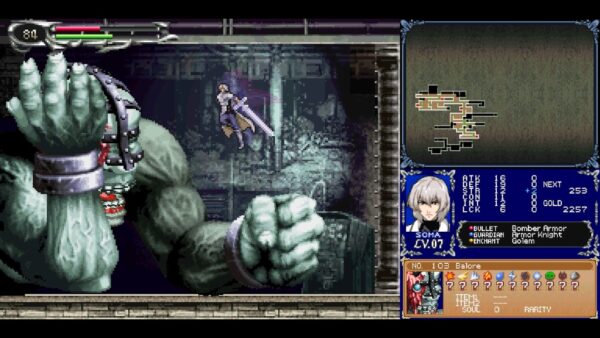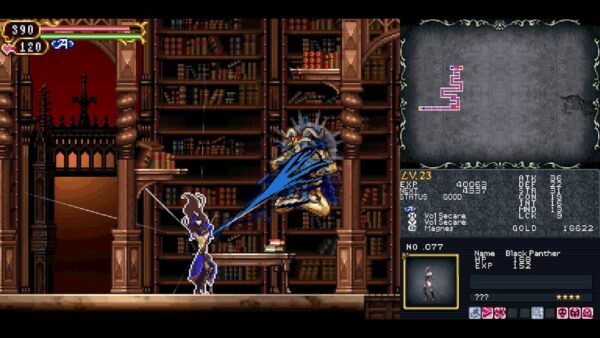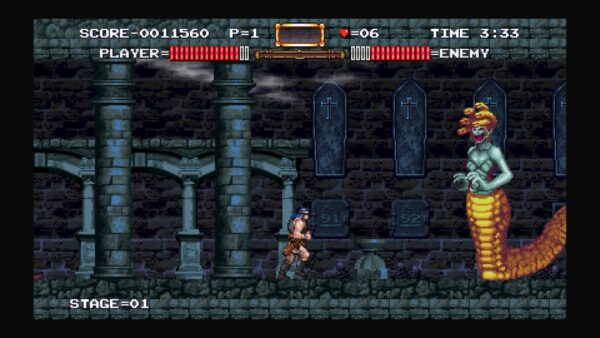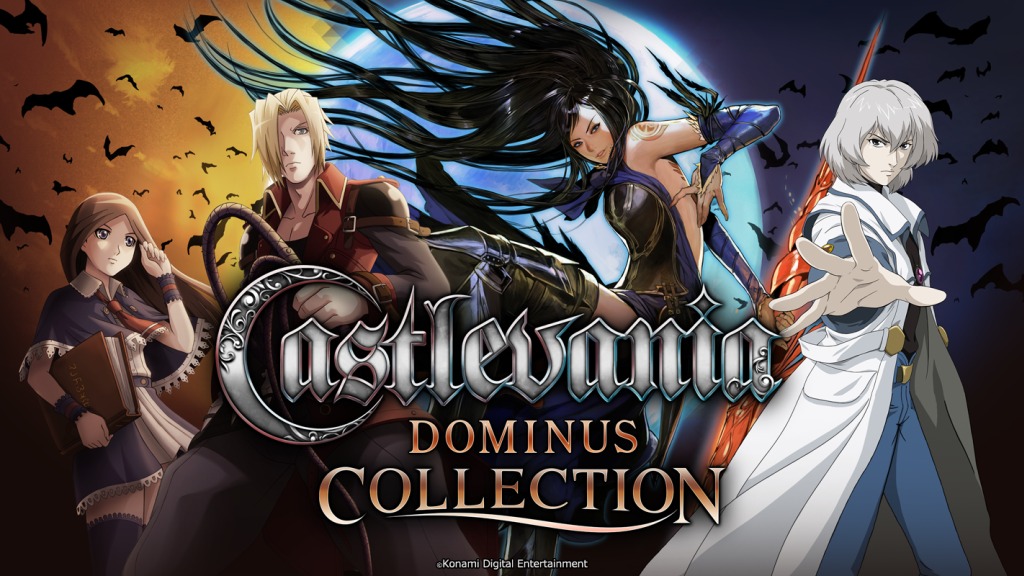Also On: PS4, PS5, Xbox One, Xbox Series X|S, Switch
Publisher: Konami
Developer: M2
Medium: Digital
Players: 1
Online: No
ESRB: T
There are few third-party franchises that I enjoy as much as Konami’s Castlevania series. Whether it’s the 8-bit action adventure entries, or the more modern “Igavania” titles like those featured in the Dominus Collection being reviewed here, I’m always happy to play more, or in this case revisit games that I already know I love. We could spend some time lamenting the lack of new Castlevania games to enjoy, but we’ll leave that for another time. Instead, lets take a look at Castlevania Dominus Collection, what all it entails, and how the whole package comes together on modern platforms.
This collection features the three Castlevania games that were originally created for the Nintendo DS. This includes Castlevania: Dawn of Sorrow, Castlevania: Portrait of Ruin, and Castlevania: Order of Ecclessia. These three titles fall into what is commonly referred to as the Metroidvania genre, or more specifically, Igavania, named after the producer of these titles Koji Igarashi. The original PlayStation game, Castlevania: Symphony of the Night, was the kickoff for these types of Castlevania games, offering up open maps to explore, with upgrades, RPG-style experience mechanics, large boss monsters, and plenty of secrets packed in to discover.
 The three DS games featured here are no different. These are pretty beefy adventures individually, featuring new characters, concepts, and an overall continuation of story threads introduced in earlier games. Dawn of Sorrow is the only real actual sequel in the bunch, it directly follows the last game released on GameBoy Advance, Aria of Sorrow, but the other two DS games are sort of stand-alone adventures with some slight ties to prior games and lore. That said, even if you’re coming into this collection without having ever played any of the prior games, I don’t think you’ll have a hard time wrapping your head around any of story or mechanics. There have been so many indie-style games that have borrowed liberally from the Castlevania series over the years that you’ll likely already have some experience with how these games play even if you’ve never touched a Castlevania title before.
The three DS games featured here are no different. These are pretty beefy adventures individually, featuring new characters, concepts, and an overall continuation of story threads introduced in earlier games. Dawn of Sorrow is the only real actual sequel in the bunch, it directly follows the last game released on GameBoy Advance, Aria of Sorrow, but the other two DS games are sort of stand-alone adventures with some slight ties to prior games and lore. That said, even if you’re coming into this collection without having ever played any of the prior games, I don’t think you’ll have a hard time wrapping your head around any of story or mechanics. There have been so many indie-style games that have borrowed liberally from the Castlevania series over the years that you’ll likely already have some experience with how these games play even if you’ve never touched a Castlevania title before.
The first game in this collection, Castlevania: Dawn of Sorrow, was released within the first year of the Nintendo DS launch, and reflects that a bit by having the most touch-screen elements of the three games. Considering some of the platforms that the Dominus Collections is available on, developer M2 had to come up with a way to get around those touch screen controls, and did so by implementing a pointer that you can bring up at any time in order to interact with the screen when required. Dawn of Sorrow featured a seal system, mostly used at the end of a boss fight to seal away the boss and strike the final blow. This is the one touch screen element in the game that was kind of tight on the timing, so the pointer system in this collection isn’t used, instead the sealing has become a small quick-time event requiring you to press a combination of buttons in order to complete the seal. It’s a solid workaround here, and I think I prefer it over the original touch-screen gimmick.
 That said, the pointer isn’t always a great replacement for touch screen mechanics in Dawn of Sorrow. In particular there is an early ability you get that allows you to destroy blocks of ice on screen that block your path, and there’s at least one segment where you’re required to destroy these blocks while on a moving platform that’s kind of tricky to pull off with just the pointer. If you’re playing on Switch in handheld mode, you can use the touch screen here and in other places, just like the DS, and it’s probably the best way to handle this particular game in the collection.
That said, the pointer isn’t always a great replacement for touch screen mechanics in Dawn of Sorrow. In particular there is an early ability you get that allows you to destroy blocks of ice on screen that block your path, and there’s at least one segment where you’re required to destroy these blocks while on a moving platform that’s kind of tricky to pull off with just the pointer. If you’re playing on Switch in handheld mode, you can use the touch screen here and in other places, just like the DS, and it’s probably the best way to handle this particular game in the collection.
The other two games, Portrait of Ruin and Order of Ecclessia, aren’t as reliant on touch-screen mechanics, and as such are more suited to regular platforms like the PS5 or Xbox Series X. Both games were a little later in the lifetime of the Nintendo DS, and the need to utilize the second screen on the system was more relegated to maps and other info at that point, making these two games a little less reliant on system specific gimmicks. However, all three games do still utilize a second screen mechanic throughout, and you can choose from a few different layouts in the options to display that extra screen however you want. I do like having the map in all three games available at all times, and it’s fairly easy to read even when playing on the Switch in handheld mode.
 In addition to the three DS games, this collection also has two notable extras. One is the original Haunted Castle, which was an arcade rendition of Castlevania. It’s tough as nails, and frankly not that fun, but it is a piece of history that rarely gets ported to anything so it’s nice to have it regardless. The rewind function that’s featured in this collection across all games makes it a little more tolerable to play, and it’s probably something you’ll need to use if you have any hopes of completing it. The other extra is Haunted Castle Revisted, which is a remake of Haunted Castle, and something completely new. It’s an excellent remake as well, with improved mechanics, animation, graphics, music and so on. It’s a much easier experience overall, certainly more forgiving than the original game, and well worth checking out.
In addition to the three DS games, this collection also has two notable extras. One is the original Haunted Castle, which was an arcade rendition of Castlevania. It’s tough as nails, and frankly not that fun, but it is a piece of history that rarely gets ported to anything so it’s nice to have it regardless. The rewind function that’s featured in this collection across all games makes it a little more tolerable to play, and it’s probably something you’ll need to use if you have any hopes of completing it. The other extra is Haunted Castle Revisted, which is a remake of Haunted Castle, and something completely new. It’s an excellent remake as well, with improved mechanics, animation, graphics, music and so on. It’s a much easier experience overall, certainly more forgiving than the original game, and well worth checking out.
As a complete package, Castlevania Dominus Collection is definitely worth playing. I’ve played on both PC and Switch without any noticeable issues, and I’d imagine most platforms will fare the same. Switch may win out a bit due to the option to actually use touchscreen controls, but I wouldn’t call it a requirement to enjoy these games. All three of the original DS games hold up extremely well, and M2’s track record with excellent classic ports remains intact here. Absolutely pick this up when you get a chance, you won’t be disappointed.
Note: Konami provided us with a Castlevania Dominus Collection PC code for review purposes.

